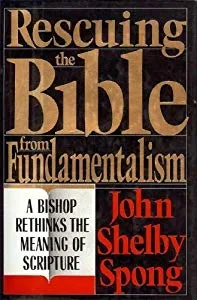Anonymous 3:24 PM said...
“My personal observation is that those who worked long and hard in school, do well in their Christian walk. Those who didn't study and do their homework, continue the pattern for the rest of their lives. ..... or they will become spiritual failures. Then they will come to Banned, posting that there is no God and that the bible is not His inspired word.”
Spong was born in Charlotte, North Carolina, and educated in public schools there. He attended the University of North Carolina at Chapel Hill, where he was elected to the Phi Beta Kappa honor society and graduated with a Bachelor of Arts degree in 1952. He received his Master of Divinity degree from the Virginia Theological Seminary in 1955. He has had honorary Doctor of Divinity degrees conferred on him by Virginia Theological Seminary and Saint Paul's College, Virginia, as well as an honorary Doctor of Humane Letters conferred by Muhlenberg College in Pennsylvania.
In 2005, he wrote: "[I have] immerse[d] myself in contemporary Biblical scholarship at such places as Union Theological Seminary in New York City, Yale Divinity School, Harvard Divinity School and the storied universities in Edinburgh, Oxford and Cambridge."[2]
Spong served as rector of St. Joseph's Church in Durham, North Carolina, from 1955 to 1957; rector of Calvary Parish, Tarboro, North Carolina, from 1957 to 1965; rector of St. John's Church in Lynchburg, Virginia, from 1965 to 1969; and rector of St. Paul's Church in Richmond, Virginia, from 1969 to 1976. He has held visiting positions and given lectures at major American theological institutions, most prominently at Harvard Divinity School. He retired in 2000. As a retired bishop, he is a member of the Episcopal Church's House of Bishops.[3] During his tenure as Bishop of Newark, confirmed communicants in the diocese virtually halved, from 44,423 in 1978, to 23,073 in 1996.
Spong describes his own life as a journey from the literalism and conservative theology of his childhood to an expansive view of Christianity.
Book Overview
A global and pioneering leader of progressive Christianity and the bestselling author of Why Christianity Must Change or Die and Eternal Life explains why a literal reading of the Gospels is actually heretical, and how this mistaken notion only entered the church once Gentiles had pushed out all the Jewish followers of Jesus. A man who has consciously and deliberately walked the path of Christ, John Shelby Spong has lived his entire life inside the Christian Church. In this profound and considered work, he offers a radical new way to look at the gospels today as he shows just how deeply Jewish the Christian Gospels are and how much they reflect the Jewish scriptures, history, and patterns of worship. Pulling back the layers of a long-standing Gentile ignorance, he reveals how the church's literal reading of the Bible is so far removed from these original Jewish authors' intent that it is an act of heresy. Using the Gospel of Matthew as a guide, Spong explores the Bible's literary and liturgical rootsits grounding in Jewish culture, symbols, icons, and storytelling traditionto explain how the events of Jesus' life, including the virgin birth, the miracles, the details of the passion story, and the resurrection and ascension, would have been understood by both the Jewish authors of the various gospels and by the Jewish audiences for which they were originally written. Spong makes clear that it was only after the church became fully Gentile that readers of the Gospels took these stories to be factual, distorting their original meaning. In Biblical Literalism: A Gentile Heresy, Spong illuminates the gospels as never before and provides a better blueprint for the future than where the church's leaden and heretical reading of the story of Jesus has led usone that allows the faithful to live inside the Christian story in the modern world.
"As far as the evolutionary debate is concerned, it is really over, and if the religious community does not know that Darwin has already won, they are simply not abreast of the times. Only in the South do I still hear people debating for Creationism."
"I wish you well. However, survival rate in that context, please know, is not high"





